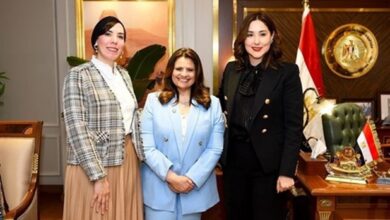
The Egyptian feminist organization, the Women and Memory Forum (WMF), published the first volume in their series of feminist translations, “Reader on Gender and Political Science,” in 2010. And they are anticipating the publication of the second, a "Reader on Feminism and Religious Studies," in the coming weeks.
Though other institutions, such as Egypt’s National Center for Translation, have translated a number of feminist works on a case-by-case basis, the comprehensive effort to make scholarly feminist writings in English available to Arabic readers is unique.
The inspiration for the project, according to WMF founding member Hala Kamal, came through the organization’s work in promoting women’s studies and feminism as an academic discipline in Egypt. Since its establishment in 1995, the mission of the group of women scholars has been to “produce and disseminate alternative knowledge about women in the Arab region” and to “reread Arab tradition and cultural history.”
Access as power
According to Kamal, one of the biggest problems they face when they work with students who want to train as researchers in gender studies is difficulty in accessing foundational works that have been written in English.
“When you read theory, it’s not straightforward, even when you’re reading it in your mother tongue; you need to consider the language itself. If this language is a foreign language to you, then it makes things much more difficult,” Kamal explains. “Our vision is to empower Arab women by offering them the knowledge to which they have no access, to build on it, to challenge it, to get into a kind of exchange with it.”
WMF’s translating gender project aims to produce six readers that can serve as introductory textbooks for gender studies and feminist research methods within various fields, one volume for each field: religious studies, history, political science, literary criticism, psychology and anthropology/sociology. They are designed for use in an academic context, for young scholars who want to specialize in gender studies or use feminist research methods in other fields.
Currently the American University in Cairo’s (AUC) Cynthia Nelson Institute for Gender and Women’s Studies is the only available program dedicated to gender studies in Egypt, and since its work is in English, its resources are not available to many interested students. However, while Egyptian public universities do not have women’s studies departments or majors, many of them do offer courses at the graduate level or include feminist readings as part of general theory courses, and there is enough interest among students that the WMF has been invited to run workshops and seminars at Cairo University. They have also been invited to participate in a gender-training course with the Beirut Arab University. They have already used the translated articles, many of them pre-publication, as part of their curriculum and have begun to get feedback from students.
In order to produce the volumes, they first recruited specialists in each of the fields, primarily relying on scholars from the group’s board and founders, but also reaching out to specialists outside the organization, to select the most relevant or significant articles for inclusion and to edit the translations. In order to avoid the problem of mistranslations, they had three criteria for translators: previous experience with published translations, background in the field or discipline at hand, and interest in feminism.
Randa Aboubakr, translator of the forthcoming reader on feminism and religious studies, says that she is an exception to the rule. Aboubakr does not have an academic background in religious studies and was chosen, in the absence of any translators specializing in theology, for her extensive experience as a translator. A professor in the department of English and comparative literature at Cairo University, she has published numerous translations of poetry and literature, as well as academic texts.
Translating the "Reader on Feminism and Religious Studies," however, was one of the most difficult tasks she has worked on.
“It took more than three years to finish. It’s the longest I’ve ever spent on a single work,” Aboubakr tells Al-Masry Al-Youm.
Gendering the Arabic
The "Reader on Feminism and Religious Studies" includes a selection of articles starting from the early 80s up until the present, which represent a chronology of the development of feminist theology and include a range of perspectives in both the Islamic and Christian traditions. Translating the sophisticated theological arguments, which draw on the methods of various disciplines, required an immense amount of research. For articles based in the Christian tradition, Aboubakr consulted with a specialist in Christian theology to find the terminology that is currently used in Arabic writings on Christianity.
One of the central challenges of translating the readers, for Aboubakr and the other translators, was working with the specifics of feminist discourse.
“The language that feminists use is usually this kind of inclusive language that does not seek to highlight difference between male and female. For example you would not say ‘his‘ about the reader, but you would say ‘her’ or sometimes say ‘thir,' but in Arabic it’s difficult to reproduce that, because Arabic is more gender-inscribed,” she explains.
Aboubakr cites an example from the religious studies reader: an article that focuses on a rereading of the story of Genesis, arguing that the first being created was in fact neither male nor female. “The whole argument was that the translation of the Old Testament from Hebrew to other languages is what made it male. So whenever [the author] was referring to Adam, she referenced with ‘it’ because it was neither male nor female. In Arabic you cannot do that.”
Because Arabic lacks a gender-neutral pronoun, Aboubakr chose to translate using both the female and male pronoun (he/she), but the solution was not a perfect one, as she said using double pronouns so frequently “becomes cumbersome in the text.”
Even the term gender itself presented a problem for translators, as there is not a consistent, unified translation for it in Arabic currently in use. For example, according to Kamal, sociologists typically use the word noa', but in literary criticism noa' is well-established as a translation for “genre.” In the end they decided to use different translations depending on the expectations of the field and the context, while for other terms, they simply had to explain the meaning. For example, the term “queer” was also a challenge, because it derives from a specific history rooted in English. The word evolved from a more general term simply meaning unusual or strange to become a pejorative word for gays and lesbians, which was then later reclaimed by this community to become a blanket term for anyone who is not heterosexual. Mostly when the word has been used in Arabic, it has been in contexts in which the writer and their audience are already familiar with the term in English, and simply transliterate it into Arabic letters.
The religious studies reader is perhaps the most likely of the volumes to provoke controversy. For example, at a seminar held at AUC on the project when Aboubakr mentioned that one of the Islamic feminist writers in the volume refers to “God, herself” in passing in the article, she recalls hearing an audible gasp from many members of the crowd. In translating a volume that included some fairly radical reinterpretations of theology, Aboubakr said she felt it was important to try to mediate this response of readers to some extent.
“It’s always important not to shock the audience; it’s not just because you want to lower your expectations, but I think communication is key in translation, translation is about communication, so if you lose your audience then you are not doing the right job. So I had all the time to balance the shock that was going to be produced with the communicability of the text.”
However, this is not to suggest that the project hopes to avoid controversy altogether. According to Aboubakr, one of the values of the project is that it will expose readers to new ideas and “shake some concepts in the minds of people.” Part of the aim is to experiment with feminist language formulations in Arabic. “To create new knowledge, you need to create new language.” For this reason, the translators and editors as a group decided to insist on using the feminine ending to refer to the reader in general terms, instead of the masculine, even when the original article in English does not. If the masculine can be understood to refer to men and women, the reasoning goes, then so too can the feminine.
Links on the global map
Another potential point of controversy is the project’s focus on works in English, a dynamic the organization is well aware of. The editor of the gender and political science reader, Mervat Hatem, emphasized in her introduction that the goal is not to convince readers that the scholarship on gender studies produced in English is better than what is produced elsewhere in the world, nor to encourage readers to uncritically absorb the perspectives of the authors, but to expose them to texts critical to the field.
The idea, Kamal said, is that there is an international conversation going on about gender and by and large that conversation is in English. If Egyptian scholars are to participate in this conversation, they need access to the English texts.
Kamal notes that there is significant pressure on many Egyptian academics to publish works internationally, which in practical terms means publishing in foreign languages, a result of power dynamics which she describes as “what globalization has to offer us at our part of the world.”
The WMF would like to expand their translation efforts to include translations from other foreign languages, as well as to translating feminist works written in Arabic into other languages, adds Kamal. But translating English into Arabic made the most sense as a starting point, both because of the availability of English translators relative to other languages, and in order to prioritize the needs of young Egyptian scholars wanting to connect to international feminist discourse.
Declare your "agenda"
The relationship to Western feminist movements can be something of a sensitive topic for Egyptian feminist organizations, which often face accusations that they are merely imitating Western ideas, or at worst, acting as agents of a foreign agenda.
“One of the reasons the Women and Memory Forum came into being was to confront these claims,” says Kamal. “By studying our own history, we develop kind of a counter-argument, showing that the movement goes back to the Egyptian feminist movement over a hundred years ago, and even earlier.”
Much of the WMF’s work has focused on documenting the roots of Egyptian feminism and history from a female perspective more generally, maintaining a library of scholarly resources, recording oral histories, and republishing the works of early 20th century pioneers such as Malak Hifni Nassef and Nabuwiyya Musa.
“This is of course a very typical kind of argument that is used to discredit all the work women are [doing], and not only women,” Kamal adds. “This is the same way of attacking that is used against civil rights organizations, and human rights organizations, because they are the power behind change.”




